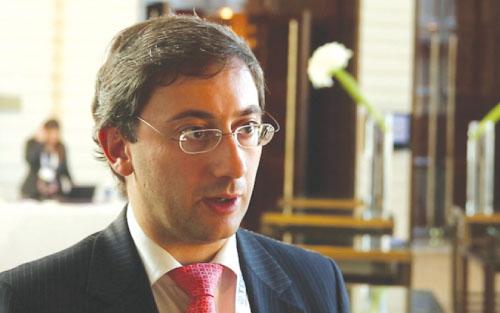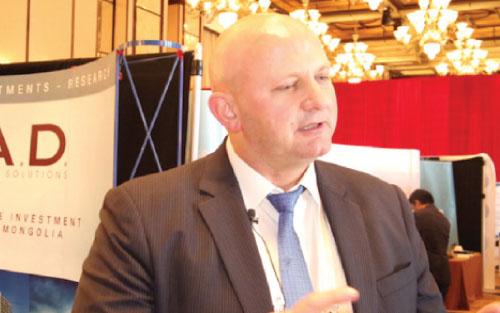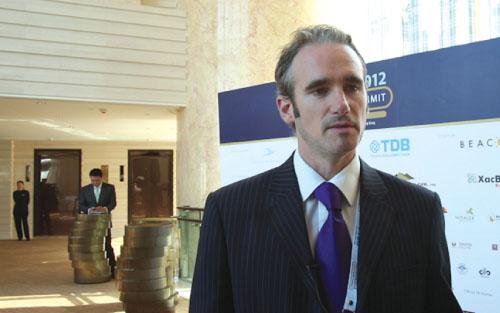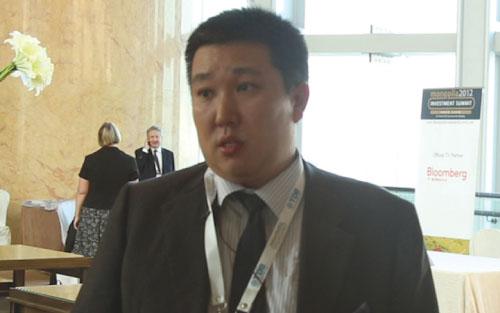By B.Aligermaa
Maxim Berdichevsky, Counsellor and Senior Trade Commissioner at the Embassy of Canada, talks to the Mongolian Mining Journal.
What are the main risks foreign investors face in Mongolia?I think it would be fair to say that right now one of the gest risks is a lack of clarity in the Government policy and Government procedures. I understand it has been an election year, and there’ve been a lot of changes in the Government, but now that the new government has been fully established and functioning, most investors are expecting a little bit more clarity from the Government officials and from Parliament on what would be the rules of engagement. And I think a very good example of that would be the publication of new regulations for implementation of a foreign investment law.
What should the government do to welcome foreign investors?Well, I think my answer would be very similar to the first question and that is: to provide clarity. One must understand that foreign investors -- not just in Mongolia, but in every country -- are happy to play by the rules, as long as they know what the rules are. I think right now a lot of investors are asking themselves the question, “What are the rules?” These seem to be changing all the time. Rules can be tougher in one place than in others, but investors who do business in emerging markets and frontier markets are used to adjusting themselves to different rules. The key thing is to have clarity, to have a clear and transparent mechanism for implementation of legislation and regulations, so that there is a sense of stability and no worries aboutunpredictability. One should know that if one does certain things, one starts at point A and if one takes certain steps, one will get to point B.
We hear a lot about resource nationalism. Do you feel it is just starting in Mongolia or is it at its final stage?
Difficult to say. There are certainly many here who believe that Mongolian national influence in the resource sector should be strengthened. Their views have a lot of merit, as certainly the mineral wealth belongs to Mongolia and its people, but I think they have to be balanced against the capacity -- technical, financial or otherwise -- of Mongolia today to fully exploit these resources for the benefit of its people. So the answer is not either of the extremes, the answer is somewhere in the middle and there has to be a healthy balance. Of course, Mongolia’s national interests should be protected, but this should take into consideration the need of foreign investors to have a stable and predictable environment in which they can operate, in which they can make a profit. Investors come to do business here in order to make a profit, but also to meaningfully contribute to Mongolian development.
The Mongolian government is going to issue bonds. Do you think it is a good idea?I certainly think that the bond issue would be successful. I am sure many in the investment community around the world are convinced of Mongolia’s great potential. I feel the risks thatthe government senses in going to capital marketsright now stem from the lack of clarity in the regulatory environment that I have been talking about. That scares off both strategic investors and portfolio investors. And these risks can materialise in two main ways: weak demand for the paper or a high price that the government may have to pay to issue this debt. In the absolute extreme scenario,there will be no demand for the paper, but in a more realistic scenario the demand may be limited and the price higher than what it could be if the government were a little bit more forthcoming with the foreign investment community in terms of how it wants to regulate foreign investment in the country.
Are foreign investors likely to invest in infrastructure and manufacturing projects in 2013?If you permit me, I shall break this question into two. Are foreign investors generally likely to invest in manufacturing and infrastructure? I think, absolutely yes. There is a great demand in Mongolia for industrial infrastructure, transport infrastructure. There can be no question that investors are interested in that. Will this happen in 2013? That, unfortunately, I can’t say. Several questions need be answered before we can answer your question. On top of all this, next year we have a presidential election in Mongolia. I think a lot of people would want to wait and see how that election will unfold and whether it leads to any meaningful changes in the direction of government policies.
 Andrew Johnson, Managing Director, Maxwell Johnson Ltd, and Australian International & Luxury Properties “When things start happening, it brings more confidence”
Andrew Johnson, Managing Director, Maxwell Johnson Ltd, and Australian International & Luxury Properties “When things start happening, it brings more confidence”Andrew Johnson, Managing Director, Maxwell Johnson Ltd, and Australian International & Luxury Properties, answers questions from The Mongolian Mining Journal.
What are the main risks foreign investors face in Mongolia?Speaking as an investor and as one representing a lot of investors, I would say that the Government policies are the key to attracting foreign investment. These days, there are so many countries and so many places in the world to put your money, so when you buy a piece of real estate or invest in buying shares in a project, you look at the opportunities, and the likely returns on your investment. This is where Government support is essential to maintain stability. The current situation is exciting from an Australian point of view, as we are both resource-rich countries. I like the opportunities in Mongolia and think it’s just a matter of having a dialogue and setting things in motion. When things start happening, it brings more confidence, and as you get more confident, you put more money into the country.
What should the government do to welcome foreign investment?I think it is doing the right things now. For example, the bond issue we are expecting for infrastructure is a fantastic move, really good and building confidence. All the talk and presentations at conferences showing how new foreign investment can actually work, and getting a sense of how people are doing business now in Mongolia, learning about agreements signed, making sure promises are kept -- all this encourages one to begin a dialogue to make sure that the benefits go to the Mongolian people and foreign investors in an equal measure. Everyone should be happy.
Are foreign investors likely to invest in infrastructure and manufacturing projects in 2013?I think so. They have to decide on whether infrastructure projects are the best destination for their money, or if there are better opportunities in providing services to the mining sector. Real estate also seems exciting, for people want to have shops to retail their products and present Mongolian brands etc. But an investor in commercial property will have to consider and calculate the likely yield, what kind of returns are to be expected, what will be the capital growth etc. It is definitely an exciting story. No matter what, 12 percent growth is still very good, compared to the rest of the world. I’m visiting Mongolia soon, to explore the realities on the ground.
 Oliver Thirlwall, Director, Asian Real Estate Capital Ltd “The investment climate is very good in non-sensitive sectors”
Oliver Thirlwall, Director, Asian Real Estate Capital Ltd “The investment climate is very good in non-sensitive sectors”Oliver Thirlwall, Director, Asian Real Estate Capital Ltd, answers questions from The Mongolian Mining Journal.
We hear a lot about resource nationalism. Do you feel it is just starting in Mongolia or is it at its final stage?I think one of the reasons why resource nationalism in Mongolia has caught the attention of investors in the way it has is because it has been so obvious and so direct. I mean the Government change policies all the time, they affect foreign investors, they change entry barriers, they change taxes, there are a lot of examples. But it is very rare that the Government talks of a policy to actually renegotiate the stake in any particular investment. Of course they said that they wanted to renegotiate the royalty rates in OT and also to renegotiate the basis of their own stake in the company. I think that was a very unwise decision and is an unwise way to achieve what they actually want to achieve. It is of course an extremely sensitive issue at the moment because it puts the basis for foreign investment at risk.
Foreign investors have been waiting for half a year for the investment climate in Mongolia to change. Do you have any advice for them?
At the moment I would tell them they have good reason to be worried if they are investing in sensitive sectors, particularly in mining. Other sectors are not so sensitive, as the laws have not changed, and the investment climate is still very good. Taxes are low and it is very easy to set up entities. Of course it is a freely convertible currency. So in general, if you are in a non-sensitive sector I think the investment prospects are promising.

Shigeru Abo, Chief Financial Officer, JP Mongolian Capital Management “Liquidity is the main risk here”Shigeru Abo, Chief Financial Officer, JP Mongolian Capital Management, answers questions from The Mongolian Mining Journal.
What are the main risks for foreign investors in Mongolia?Primarily,I would say, it is liquidity. That is very important. Every mining concession should be subject to third party audit. Now things are getting better, but it is very important to think about liquidity.
What should the government do to welcome foreign investors?The Ministry of Finance must play a more proactive role. Many people think of mining as being only a production industry and downplay its financial components. Protection of investment is most important and getting the Ministry of Finance to ensure this would take foreign investment to a new level altogether. At a conference the talk is only about the industrial aspects of mining, but this is not enough. Financial regulations, too, need to be discussed more seriously.
The Mongolian government is going to issue bonds. Do you think it is a good idea?Investors value Mongolia for its natural resources. You are fortunate to have so much of it in your country, but where is the cash to develop them, to build industries based on them? So I welcome issue of bonds but there should be some incentives for buyers. Government bonds should be convertible, like a mining concession. Maybe, something similar to Moving Strike Convertible Bond can be considered.



